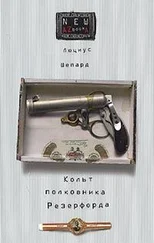Two flat cracks—pistol shots—sent him stumbling away from the wall, his heart racing. Inside his head the shots had spoken the two syllables of Baylor’s name. All the kids and beggars had vanished. All the soldiers had stopped and turned to face the direction from which the shots had come: zombies who had heard their master’s voice.
Another shot.
Some soldiers milled out of a side street, talking excitedly. “… fuckin’ nuts!” one was saying, and his buddy said, “It was Sammy, man! You see his eyes?”
Mingolla pushed his way through them and sprinted down the side street. At the end of the block a cordon of MPs had sealed off access to the right-hand turn, and when Mingolla ran up one of them told him to stay back.
“What is it?” Mingolla asked. “Some guy playing Sammy?”
“Fuck off,” the MP said mildly.
“Listen,” said Mingolla. “It might be this friend of mine. Tall, skinny guy. Black hair. Maybe I can talk to him.”
The MP exchanged glances with his buddies, who shrugged and acted otherwise unconcerned. “Okay,” he said. He pulled Mingolla to him and pointed out a bar with turquoise walls on the next corner down. “Go on in there and talk to the captain.”
Two more shots, then a third.
“Better hurry,” said the MP. “Ol’ Captain Haynesworth there, he don’t have much faith in negotiations.”
It was cool and dark inside the bar; two shadowy figures were flattened against the wall beside a window that opened onto the cross-street. Mingolla could make out the glint of automatic pistols in their hands. Then, through the window, he saw Baylor pop up from behind a retaining wall: a three-foot-high structure of mud bricks running between a herbal drugstore and another bar. Baylor was shirtless, his chest painted with reddish-brown smears of dried blood, and he was standing in a nonchalant pose, with his thumbs hooked in his trouser pockets. One of the men by the window fired at him. The report was deafening, causing Mingolla to flinch and close his eyes. When he looked out the window again, Baylor was nowhere in sight.
“Fucker’s just tryin’ to draw fire,” said the man who had shot at Baylor. “Sammy’s fast today.”
“Yeah, but he’s slowin’ some,” said a lazy voice from the darkness at the rear of the bar. “I do believe he’s outta dope.”
“Hey,” said Mingolla. “Don’t kill him! I know the guy. I can talk to him.”
“Talk?” said the lazy voice. “You kin talk ’til yo’ ass turns green, boy, and Sammy ain’t gon’ listen.”
Mingolla peered into the shadows. A big, sloppy-looking man was leaning on the counter; brass insignia gleamed on his beret. “You the captain?” he asked. “They told me outside to talk to the captain.”
“Yes, indeed,” said the man. “And I’d be purely delighted to talk with you, boy. What you wanna talk ’bout?”
The other men laughed.
“Why are you trying to kill him?” asked Mingolla, hearing the pitch of desperation in his voice. “You don’t have to kill him. You could use a trank gun.”
“Got one comin’,” said the captain. “Thing is, though, yo’ buddy got hisself a coupla hostages back of that wall, and we get a chance at him ‘fore the trank gun ‘rives, we bound to take it.”
“But…” Mingolla began.
“Lemme finish, boy.” The captain hitched up his gunbelt, strolled over and draped an arm around Mingolla’s shoulder, enveloping him in an aura of body odor and whiskey breath. “See,” he went on, “we had everything under control. Sammy there…”
“Baylor!” said Mingolla angrily. “His name’s Baylor.”
The captain lifted his arm from Mingolla’s shoulder and looked at him with amusement. Even in the gloom Mingolla could see the network of broken capillaries on his cheeks, the bloated alcoholic features. “Right,” said the captain. “Like I’s sayin’, yo’ good buddy Mister Baylor there wasn’t doin’ no harm. Just sorta ravin’ and runnin’ round. But then ‘long comes a coupla our Marine brothers. Seems like they’d been givin’ our beaner friends a demonstration of the latest combat gear, and they was headin’ back from said demonstration when they seen our little problem and took it ‘pon themselves to play hero. Wellsir, puttin’ it in a nutshell, Mister Baylor flat kicked their ass. Stomped all over their esprit de corps. Then he drags ’em back of that wall and starts messin’ with one of their guns. And…”
Two more shots.
“Shit!” said one of the men by the window.
“And there he sits,” said the captain. “Fuckin’ with us. Now either the gun’s outta ammo or else he ain’t figgered out how it works. If it’s the latter case, and he does figger it out…” The captain shook his head dolefully, as if picturing dire consequences. “See my predicament?”
“I could try talking to him,” said Mingolla. “What harm would it do?”
“You get yourself killed, it’s your life, boy. But it’s my ass that’s gonna get hauled up on charges.” The captain steered Mingolla to the door and gave him a gentle shove toward the cordon of MPs. “’Preciate you volunteerin’, boy.”
Later Mingolla was to reflect that what he had done had made no sense, because—whether or not Baylor had survived—he would never have been returned to the Ant Farm. But at the time, desperate to preserve the ritual, none of this occurred to him. He walked around the corner and toward the retaining wall. His mouth was dry, his heart pounded. But the shaking in his hand had stopped, and he had the presence of mind to walk in such a way that he blocked the MPs’ line of fire. About twenty feet from the wall he called out, “Hey, Baylor! It’s Mingolla, man!” And as if propelled by a spring, Baylor jumped up, staring at him. It was an awful stare. His eyes were like bulls-eyes, white showing all around the irises; trickles of blood ran from his nostrils, and nerves were twitching in his cheeks with the regularity of watchworks. The dried blood on his chest came from three long gouges; they were partially scabbed over but were oozing a clear fluid. For a moment he remained motionless. Then he reached down behind the wall, picked up a double-barreled rifle from whose stock trailed a length of flexible tubing, and brought it to bear on Mingolla.
He squeezed the trigger.
No flame, no explosion. Not even a click. But Mingolla felt that he’d been dipped in ice water. “Christ!” he said. “Baylor! It’s me!” Baylor squeezed the trigger again, with the same result. An expression of intense frustration washed over his face, then lapsed into that dead man’s stare. He looked directly up into the sun, and after a few seconds he smiled: he might have been receiving terrific news from on high.
Mingolla’s senses had become wonderfully acute. Somewhere far away a radio was playing a country and western tune, and with its plaintiveness, its intermittent bursts of static, it seemed to him the whining of a nervous system on the blink. He could hear the MPs talking in the bar, could smell the sour acids of Baylor’s madness, and he thought he could feel the pulse of Baylor’s rage, an inconstant flow of heat eddying around him, intensifying his fear, rooting him to the spot. Baylor laid the gun down, laid it down with the tenderness he might have shown toward a sick child, and stepped over the retaining wall. The animal fluidity of the movement made Mingolla’s skin crawl. He managed to shuffle backward a pace and held up his hands to ward Baylor off. “C’mon, man,” he said weakly. Baylor let out a fuming noise—part hiss, part whimper—and a runner of saliva slid between his lips. The sun was a golden bath drenching the street, kindling glints and shimmers from every bright surface, as if it were bringing reality to a boil.
Читать дальше






